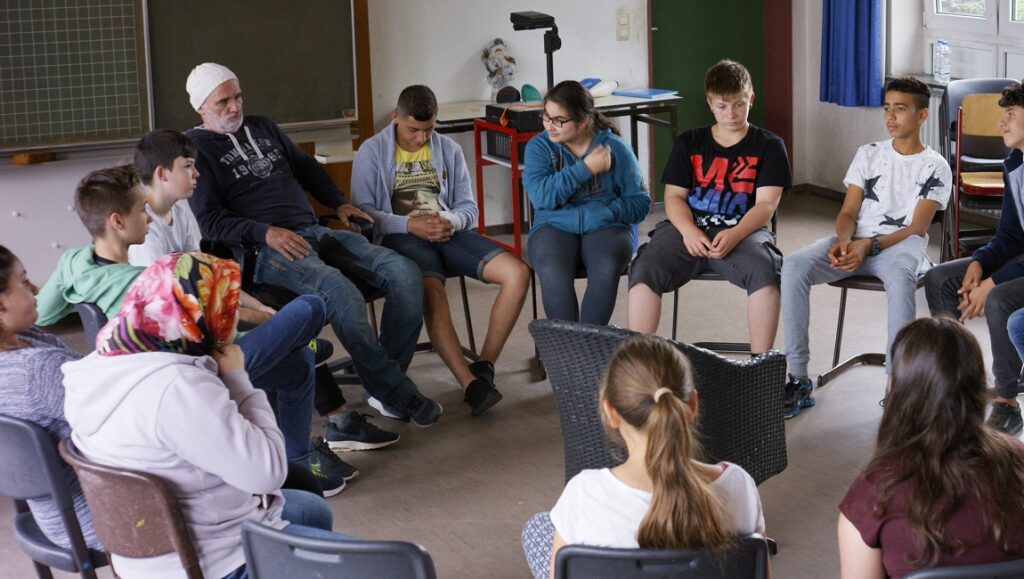Although Maria Speth is often associated with the so-called group of “Berlin School” cineastes, she might be the least internationally-recognized filmmaker of the bunch. Her latest effort, Mr. Bachmann and His Class, sees the Bavarian director back to filmmaking seven years after 2014’s Daughters, and the film is her sophomore documentary feature after 2011’s 9 Lives. If there’s a thematic thread to be found in Speth’s work, it’s perhaps best expressed as an interest in outsider characters; usually, youngsters in search of identity and belonging, frequently in context to their relationship with older generations. In this way, her new, 217-minute documentary is no exception: here, as the title suggests, Speth focuses on the quotidian experiences of her longtime schoolteacher friend, Dieter Bachmann, and his class at a local school in Georg-Büchner-Gesamtschule in Stadtallendorf, North Hesse. Mr. Bachmann’s class, which consists of 12-to-14-year-olds of various ethnicities and with different cultural and religious backgrounds, shapes a microcosm of this provincial German industrial town. His personal and emotional rapport with the pupils and his unconventional and nonconformist teaching methods hugely contrast with the rigid educational system, as he enables and encourages the kids to freely express themselves in an accepting, open environment. Bachmann — who often wears AC/DC t-shirts, plays Deep Purple guitar riffs, and croons Bob Dylan tunes to his class — is truly of a different era, and Speth, intentionally and without over-relying on his background, meaningfully delineates a portrait of the man as an ex-revolutionary hippie and free spirit. “These grades don’t reflect who you are at all […] What’s much more important is that you’re all terrific kids and youngsters. You’re all really honest. Remain true to yourselves,” are the final words he communicates to his young adherents.
Speth’s purely observational style is most reminiscent of Frederick Wiseman’s work — a comparison further reinforced given the film’s unusually lengthy runtime — but there are some notable differences: her aesthetic, unlike that of Wiseman, can at times take on a deeply intimate feel toward her human subjects, with her camera often closing distances, emphasizing facial and gestural expressions more than the encompassing spaces. Keeping her concentration on the single-classroom scenes, with occasional jaunts into the corridors, the gymnasium, and the school playground (as well as a few places around the town), Speth reveals her concerns for the necessity of human connection and communication in today’s increasingly disconnected society and cultural institutions. Remaining faithful to this spirit, her style also reflects a certain delicacy of dramatic storytelling, unusual within the familiar boundaries of documentary. In this way, as odd as the comparison seems on the surface, it’s not hard to come to consider Mr. Bachmann’s kind-hearted, alienated father figure as a fusion of Toni Erdmann’s eccentric galoot and Jack Black’s character in School of Rock…and all within the shape of an epic Wiseman’s doc. And yet, as understandable as Speth’s insistence on the extended length and the “real-time” process can be, it’s a strategy that isn’t always effective or of benefit to the film, and results in some excessive repetition and tonal flatness in parts — particularly around the halfway point. It’s an experience we all know, the exhaustion of classroom time, as edifying and educational and revelatory as it can often be. And so, there will likely be a point in Speth’s film that viewers will have to trust in Mr. Bachmann’s lively, charismatic presence to re-engage, another hour or two to go, an opportunity to feel and explore more if one can settle back into the film’s casual lessons and mostly rewarding rhythm.
Published as part of Berlin Film Festival 2021 — Dispatch 4.


Comments are closed.